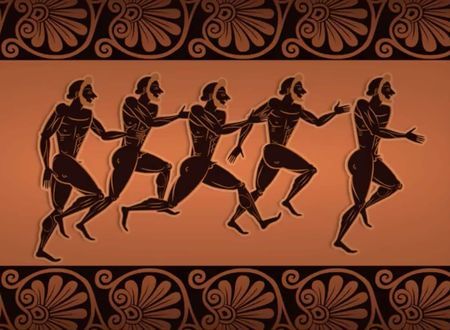Both, the Hindu and Buddhist philosophy asserts that “Life is an endless cycle of pain and suffering”. They refer to life as samsara or Maya. For a modern being, relatable reference is the “matrix” .
“You can’t diligently practice yoga, honing the clarity of your mind, and fail to be stuck by the very humorous-albeit pathetic predicament we are all in. We find ourselves chained to the wheel of karma, going round and round in our own private illusory worlds; struggling to glimpse reality and attain eternal peace. It’s funny and maddeningly difficult, and sad too, sometimes. It’s also the only game in town and nobody gets out alive.” From the Five Tibetans.
The above quote rung true and hard for me years ago when I first came across it. It rings hard even now. Especially the last line -” it’s the only game in town and no one gets out alive”.
I had posted in Q&A page of os.me “When can suffering be good for us? “. I received several replies and perspectives as answers. One theme rose above all – suffering is strongly connected to the ego.
Link: https://os.me/community/spiritual-journey/can-suffering-be-good-for-us/#post-3831
We all live in our private illusory world that is monitored by a thermostat called “ego”. It is a thermostat because it sets and decides the level at which we should operate beyond which all fail safe emergency process takes over.
For those who are not aware of what a thermostat is, the best example is the AC or a heater. The thermostat is a device within the AC or heater that ensures that any overload beyond the temperature that the AC unit or heater can take, due to manual intervention (our trying to make it very cold or very hot) will result in tripping or shutting down of the entire system so that the AC unit or heater remains safe and usable instead of getting burnt. The thermostat settings is done by a manufacturer (before it is sold) and not by the customer owning the equipment.
Ego- is the internal human equivalent of a thermostat. Unfortunately, Manufacturer (God or higher powers) settings of each human ego are tampered with and re calibrated based on our individual experiences. We mostly remain ignorant to this change in ego settings.
Ego of the adult is tuned to being self-centered instead of being self-aware. Self-centered behavior is being preoccupied or being full with ourselves. It is a natural instinct. This is so since our strongest input signals are entirely sense based and our 5 senses just let us know that we are separate from everything else. What we have experienced till now is what we have seen with our own eyes or heard with our own ears and so on. You have not seen what I have seen and vice versa. This self-centered behavior feeds the ego and the ego mind compares current event to past experiences recorded within and attaches a meaning to them often. This is the biased view each one of us keeps. And these views renders us self-conscious.
When we are self-conscious, we want to feel good about ourselves. The ego’s approach for making one feel good is again by comparing – this time comparing self with others. Soon we end up swaying up and down with feelings of either being better or sometimes worse depending on results of comparison. This results in suffering. Instead of feeling good at all times, we keep oscillating with either high or low spirit. Ego keeps us in constant state of pride, fear and worry, ready to protect us from what it considers as affront or pull-down of the self. Thermostat setting of ego which begins with “trust all” as a child, now is set to a scream with key setting as “trust no one or very few”. Little wonder that the present-day human beings are regularly filled with self-doubt, frustration, anger, irritation for the slightest change to situations not acceptable to the ego mind.
Self-awareness is seeking to expand the narrow view presented by one’s own ego. By continued practice of self-awareness, we learn to respect other views or learn to accept reality as it is. By practice of respecting other views or accepting reality of given situation, we open our mind to different possibilities and a perspective change. When one is aware of self, it is possible to observe own thoughts or actions, without being attached to them. Because of detachment, we are able to get glimpses into the interconnection between us and what ego labels as “others”. By being self-aware, we can see a bigger picture. This perspective change helps to bring us closer to our true natural self that is filled with love and trust. Suffering reduces even if does not get eliminated completely.
Both Suffering and pain is good only because it represents a barometer of our nearness or distance from our true self or nature that is of love and trust. There is an assumption here that our true nature is that of love and trust. Yet my own experiences suggest that maximum level of joy and peace was sensed often when I had acted from trust and love. The happiness that comes through comparing with others and feeling superior last only briefly. Yes-whether we should accept suffering or not is still an individual choice. This is now a matter of being true to the individual dharma (that may be influenced by the ego mind). For many who listen to ego mind and remain self-centered, suffering is not sensed immediately. The pain of one’s own heart is tolerable and is pushable to back of mind. It is when heart pain becomes intolerable that suffering is sensed urging a person to seek change or elevate swa-dharma (dharma followed till now)
Every person has a base individual dharma. Creation is such a beautiful subject that each individual is guided to rise to a higher dharma. For eg. Dharma of soldier may be to follow orders and kill enemy and not be compassionate but higher Dharma may be a calling to make all sincere efforts to not go at war. This is depicted nicely by a movie “Hunter Killer” where 2 nuclear warring nations are urged to begin war by the top brass of their respective countries but the ground commander of one side takes decisions by urging his counterpart on other side to also realize the repercussion as well as the common bond shared by them.
Our universe and the creation is perfect. Every individual is subject to counter forces that is necessary for that individual’s growth. This includes physical and mental challenges. A wife who is subject to an abusive husband, may have been brought in contact with the abusive husband in order for her to learn to rise above it and gain in such strength. It may have been her own subconscious need due to a past incomplete desire. For someone else the desire could be in some other arena and hence striving or struggle could be different.
Suffering is a sign. It offers a measure of the distance between heart (or individual soul) and the mind. For people who do not suffer, either the distance is negligible or there is no inner compulsion for change. Either there is a union of mind and soul in every thought and action (yoga) or the heart compulsions are rendered soundless or drowned by the incessant chatter of the ego mind.
If it is the later, such individuals stagnate in the spiritual realm till the time arrives for them to be able to tune in to the heart’s cries. The person still derives pleasure in ego satisfaction. Usually the tuning inward happens only when one gets utterly disillusioned with the ego games and empty happiness search outside. Then suffering begins. As the volumes of heart cries within increases, suffering is sensed acutely and each human begins the struggle for change seeking eternal joy and peace instead of false happiness. The eternal joy and peace can happen only in the now. No amount of delving in the past or scavenging for a future sign can make it happen.
It took Prince Siddarth only 1 round outside his palace gates to get deeply agonized internally paving way for his becoming a Buddha. Similarly, our experience of suffering brings a keen sense of desire for the elusive joy or peace or moksha and this desire in-turn paves way for the fulfillment to happen. Maybe this brings us to an Om swami or takes us on a path we never would have dreamed of walking few years back. If you are reading this, it is your desire for self-fulfillment that brings you here and keeps urging you to make changes in the way we look at the world. It makes us open our eyes even more widely using eyes that do not belong to us, using ears that do not belong to us. We begin to connect with the world at large and strangely we are able to tune in to ancient wisdom that was elusive earlier.
This does not mean that we should suffer for sake of suffering, it just means that we must practice more in letting go of our need for self-centered attachments towards our looks or deep urge for hoarding wealth, status, achievement tags in name of feeling secure. These attachments do not help us drive away the insecurity instead they end up making one more insecure. When we suffer during this practice of letting go, it is a sure sign that there is a tussle within between the heart and the ego which refuses to let go of old and practiced tendencies. When we contemplate on this, then we get sure that such suffering is indeed good, even if we remain wondering when it will end!









Comments & Discussion
6 COMMENTS
Please login to read members' comments and participate in the discussion.